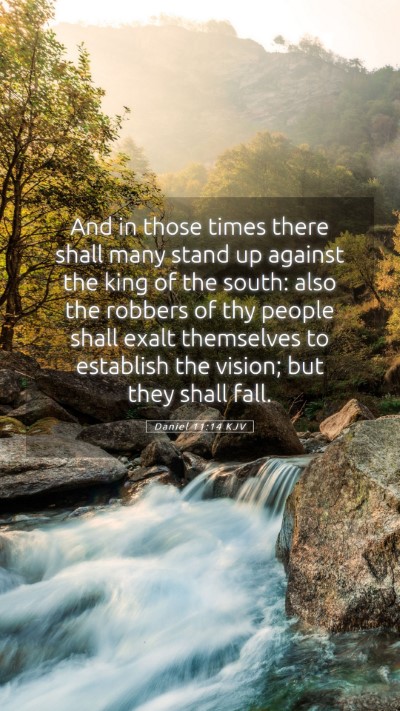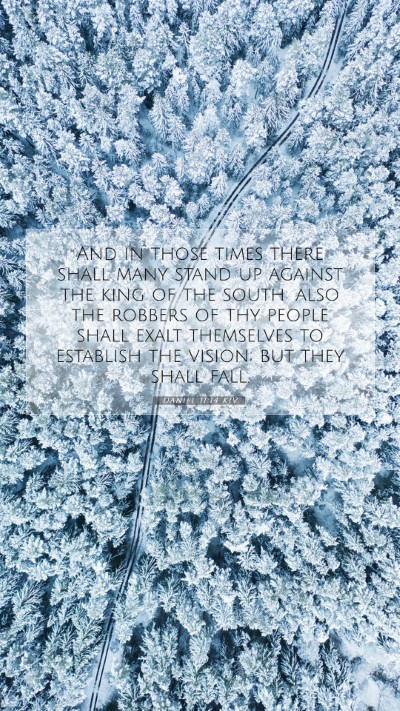Understanding Daniel 11:14: A Commentary
In Daniel 11:14, we find a verse rich in prophetic significance and historical context. This scripture, which reads: "And in those times there shall many stand up against the king of the south..." serves as a pivotal moment in the unfolding narrative of the prophecies regarding the conflicts between the kings of the North and South.
Insights from Notable Commentaries
This section combines insights from renowned public domain commentaries, providing a meticulous examination of the verse.
1. Matthew Henry's Commentary
Matthew Henry emphasizes the tumultuous nature of the times described in Daniel 11:14, highlighting how various groups rise up against the king of the south. He explains that this does not merely refer to physical battles but encapsulates a broader spiritual and political struggle. Henry notes that this scripture reflects the ongoing conflicts experienced by the Jewish people under foreign dominions, illustrating the cyclical nature of oppression and resistance.
2. Albert Barnes' Commentary
Albert Barnes provides contextual analysis regarding the geopolitical landscape at the time. He points out that the 'king of the south' likely represents the Ptolemaic kingdom of Egypt, while the 'north' symbolizes the Seleucid Empire. Barnes stresses the importance of understanding the historical events leading to these power struggles, as they reveal God's sovereignty over the affairs of nations. He concludes that amidst the upheaval, God remains in control, guiding history toward His divine purposes.
3. Adam Clarke's Commentary
Adam Clarke offers an intricate exegesis of the verse, delving into the implications of the phrase 'stand up against'. Clarke interprets this as not only a literal uprising but also as a metaphorical representation of dissenters within the Jewish community who might oppose foreign rule. He connects the historical context to future events, indicating that prophecy often has multiple fulfillments, with applications that transcend time and speak to the enduring human condition.
Historical Context
Understanding the historical backdrop of Daniel 11:14 is crucial for biblical exegesis. The passage reflects the tumultuous political landscape of the Hellenistic period, marked by the conflicts between the Ptolemaic and Seleucid empires. This period was a time of significant upheaval for the Jewish people, caught between these warring factions.
Cross References
- Daniel 8:23-25 - Another prophecy relating to conflicts and deceit.
- Daniel 9:26 - Prophetic insights about the anointed one and the destruction to come.
- Matthew 24:6 - Jesus' warning about wars and rumors of wars, reflecting ongoing strife.
Application for Believers
For modern believers, the lessons in Daniel 11:14 extend beyond its historical circumstances. The verse serves as a reminder of the spiritual battles that individuals may face. The notion of standing up against formidable forces resonates in contemporary contexts where faith might provoke resistance. In this light, Daniel 11:14 encourages steadfastness in faith, reinforcing that God's providential hand is at work even amid chaos.
Conclusion
In summary, Daniel 11:14 offers profound insights into the interplay of historical events, divine sovereignty, and spiritual warfare. Engaging with this scripture through various commentaries enriches our understanding and provides valuable Bible study insights. It enables believers to find meaning within the complexities of biblical narratives and to apply these truths to their own lives.
Further Study Resources
For those seeking deeper understanding, consider utilizing the following Bible study tools and resources:
- Bible study guides that explore themes of prophecy.
- Online Bible study courses focused on Old Testament literature.
- Discussion groups that analyze historical contexts of scripture.


